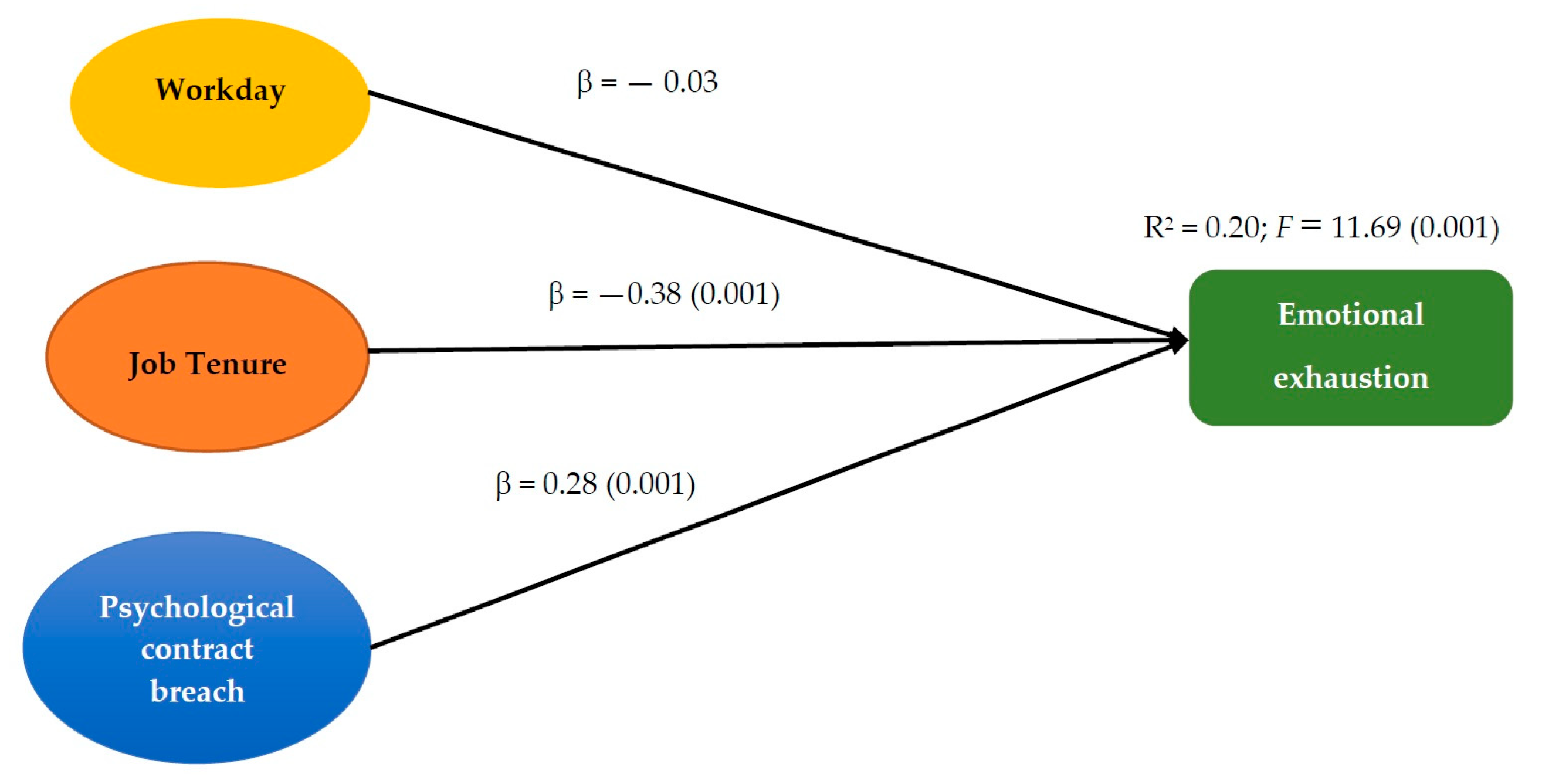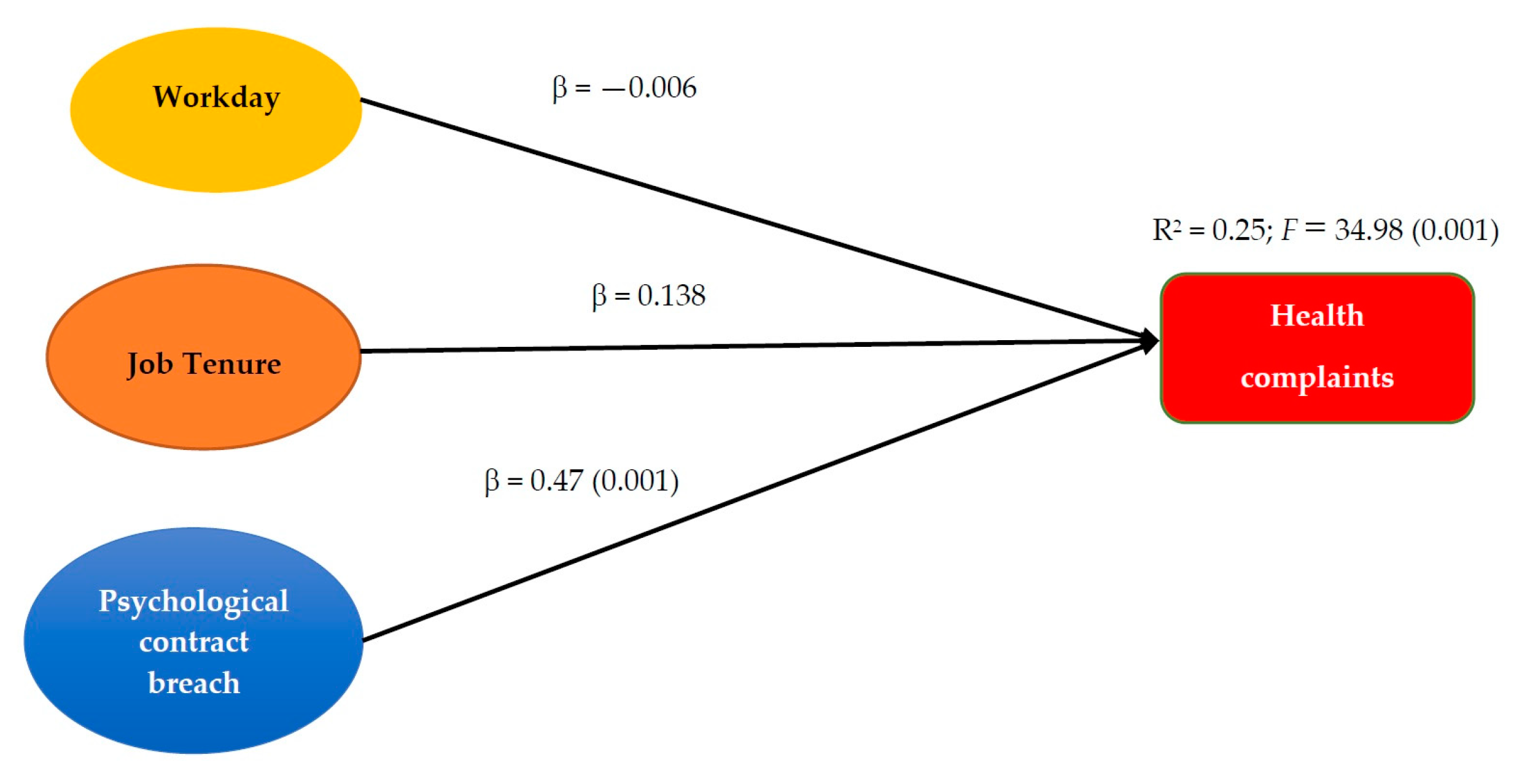Emotional Exhaustion and Health Complaints as Indicators of Occupational Diseases Among Civil Servants in Spain
Abstract
:1. Introduction
1.1. Public Employees’ Wellbeing and Psychological Contract Breach
1.2. Risky Occupations and Emotional Exhaustion
2. Method
2.1. Sample and Procedure
2.2. Instruments
- Perceived psychological contract breach: This scale, designed for this investigation, has three items of global ratings of the degree of promise fulfillment by the organization, like those used in prior studies [21]. Some of the statements are: “I get angry when I think about what I give and what I receive from the institution where I work” or “My firm does not fulfill its commitments to me at all”. Despite the scarce length of the scale, its reliability, as assessed by Cronbach’s alpha, was α = 0.77.
- Emotional exhaustion: The Cuestionario Breve de Burnout (CBB) (The Brief Burnout Questionnaire) of Moreno et al. [22] was used to assess emotional exhaustion. The original version of this instrument has 21 items that include antecedents and consequences of the syndrome, but not all of them were used in the final data analysis. The global reliability of the scale finally used in our study was α = 0.77. The Cronbach’s alpha reliability of the six items that make up the subscale of Emotional Exhaustion was α = 0.81. Some example items are: “The demands and behaviors of the people I attend irritate me”; “My work is repetitive”; “My work is boring”; and “In general, I am tired of my work”. Agreement with the items was rated on a 5-point Likert scale ranging from 1 (strongly disagree) to 5 (strongly agree).
- Health complaints: The reduced Spanish version of the Subjective Health Complaints Inventory (SHC), created by Eriksen et al. [23], was used to assess possible employees’ health problems. Self-reported health complaints were measured by means of 10 items with rating scales ranging from 1 (never) to 5 (always), which can be categorized into two subscales: pseudo-neurology (tachycardia, sleep problems, tiredness, dizziness, anxiety, and sadness/depression), and gastrointestinal problems (heartburn, ulcer, stomach ache, and diarrhea). Despite the briefness of the scale, its reliability, as assessed through Cronbach’s alpha, was α = 0.69.
3. Results
4. Discussion
5. Conclusions
Author Contributions
Funding
Conflicts of Interest
References
- Ferguson, S.A.; Smith, B.P.; Browne, M.; Rockloff, M.J. Fatigue in emergency services operations: Assessment of the optimal objective and subjective measures using a simulated wildfire deployment. Int. J. Environ. Res. Public Health 2016, 13, 171. [Google Scholar] [CrossRef] [PubMed]
- Amarneh, B.H. Social support behaviors and work stressors among nurses: A comparative study between teaching and non-teaching hospitals. Behav. Sci. 2017, 7, 5. [Google Scholar] [CrossRef] [PubMed]
- Vincent, G.E.; Aisbett, B.; Larsen, B.; Ridgers, N.D.; Snow, R.; Ferguson, S.A. the impact of heat exposure and sleep restriction on firefighters’ work performance and physiology during simulated wildfire suppression. Int. J. Environ. Res. Public Health 2017, 14, 180. [Google Scholar] [CrossRef] [PubMed]
- Eriksen, H.R. The Cognitive Activation Theory of Stress (CATS) in occupational health. In Stress and Quality of Working Life: Conceptualizing and Assessing Stress; Rossi, A.M., Meurs, J.A., Perrewé, P.L., Eds.; Information Age Publishing: Charlotte, NC, USA, 2017; pp. 41–64. [Google Scholar]
- Jay, S.M.; Smith, B.P.; Windler, S.; Dorrian, J.; Ferguson, S.A. Does suspected sleep disordered breathing impact on the sleep and performance of firefighting volunteers during a simulated fire ground campaign? Int. J. Environ. Res. Public Health 2016, 13, 173. [Google Scholar] [CrossRef] [PubMed]
- Hauck, A. The Public’s Business: The Politics and Practices of Government Corporations; MIT Press: Cambridge, MA, USA, 1978. [Google Scholar]
- Alcover, C.; Martínez-Íñigo, D.; Chambel, M. Perceptions of employment relations and permanence in the organization: Mediating effects of affective commitment in relations of psychological contract and intention to quit. Psychol. Rep. 2012, 110, 839–853. [Google Scholar] [CrossRef] [PubMed]
- Jordan, T.; Battaglio, P. Are we there yet? The state of public human resource management research. Public Pers. Manag. 2014, 43, 25–57. [Google Scholar] [CrossRef]
- Ledda, C.; Loreto, C.; Filetti, V.; Matera, S.; Vitale, E.; Bracci, M.; Rapisarda, V. Abnormal plasma cell disorders in refinery waste workers. J. Clin. Med. 2018, 7, 221. [Google Scholar] [CrossRef]
- Ebrahimi Belil, F.; Alhani, F.; Ebadi, A.; Kazemnejad, A. Self-efficacy of people with chronic conditions: A qualitative directed content analysis. J. Clin. Med. 2018, 7, 411. [Google Scholar] [CrossRef]
- Fernández-Muñoz, J.J.F.; Topa, G. Older workers and affective job satisfaction: Gender invariance in Spain. Front. Psychol. 2018, 9, 930. [Google Scholar] [CrossRef]
- Bal, P.; De Cooman, R.; Mol, S.T. Dynamics of psychological contracts with work engagement and turnover intention: The influence of organizational tenure. Eur. J. Work Organ. Psychol. 2013, 22, 107–122. [Google Scholar] [CrossRef]
- Jones, S.K.; Griep, Y. “I Can Only Work So Hard Before I Burn Out.” A time sensitive conceptual integration of ideological psychological contract breach, work effort, and burnout. Front. Psychol. 2018, 9, 131. [Google Scholar] [CrossRef] [PubMed]
- Bordia, P.; Restubog, S.D.; Tang, R.L. When employees strike back: Investigating mediating mechanisms between psychological contract breach and workplace deviance. J. Appl. Psychol. 2008, 93, 1104–1117. [Google Scholar] [CrossRef] [PubMed]
- Zhao, H.; Wayne, S.J.; Glibkowski, B.C.; Bravo, J. The impact of psychological contract breach on work-related outcomes: A meta-analysis. Pers. Psychol. 2007, 60, 647–680. [Google Scholar] [CrossRef]
- Cassar, V. Violating psychological contract terms among Maltese public service employees: Occurrence and relationships. J. Manag. Psychol. 2001, 16, 194–208. [Google Scholar] [CrossRef]
- Cassar, V.; Buttigieg, S.C.; Briner, R.B. Causal explanations of psychological contract breach characteristics. Psychol. Manager J. 2013, 16, 85–106. [Google Scholar] [CrossRef]
- Chambel, M.; Oliveira-Cruz, F. Breach of psychological contract and the development of burnout and engagement: A longitudinal study among soldiers on a peacekeeping mission. Mil. Psychol. 2010, 22, 110–127. [Google Scholar] [CrossRef]
- Schaufeli, W.B. The balance of give and take: Toward a social exchange model of burnout. Int. J. Psychol. Soc. 2006, 19, 87–131. [Google Scholar]
- Gakovic, A.; Tetrick, L.E. Psychological contract breach as a source of strain for employees. J. Bus. Psychol. 2003, 18, 235–246. [Google Scholar] [CrossRef]
- Robinson, S.L.; Morrison, E.W. The development of psychological contract breach and violation: A longitudinal study. J. Organ. Behav. 2000, 21, 525–546. [Google Scholar] [CrossRef]
- Moreno, B.; Bustos, R.; Matallana, A.; Miralles, T. La evaluación del burnout. Problemas y alternativas (The assessment of burnout. Problems and alternatives). J. Work Organ. Psychol. 1997, 13, 185–207. [Google Scholar]
- Eriksen, H.; Ihlebaek, C.; Ursin, H. A scoring system for subjective health complaints (SHC). Scand. J. Public Health 1999, 27, 63–72. [Google Scholar] [CrossRef] [PubMed]
- Silverthorne, C. The impact of organizational culture and person-organization fit on organizational commitment and job satisfaction in Taiwan. Leadership Organ. Dev. J. 2004, 25, 592–599. [Google Scholar] [CrossRef]
- Ye, J. The impact of organizational values on organizational citizenship behaviors. Public Pers. Manag. 2012, 41, 35–46. [Google Scholar] [CrossRef]
- Strohmeier, S. Employee relationship management. Realizing competitive advantage through information technology? Hum. Resour. Manag. Rev. 2013, 23, 93–104. [Google Scholar] [CrossRef]
- Sutton, G.; Griffin, M.A. Integrating expectations, experiences, and psychological contract violations: A longitudinal study of new professionals. J. Occup. Organ. Psychol. 2004, 77, 493–514. [Google Scholar] [CrossRef]
- Tho, N.D. A Configurational Role of Human Capital Resources in the Quality of Work Life of Marketers: FsQCA and SEM Findings from Vietnam. Appl. Res. Qual. Life 2018, 13, 461. [Google Scholar] [CrossRef]
- Liu, J.; Beaujot, R.; Ravanera, Z. Measuring the Effects of Stress and Social Networks on the Health of Canadians. Appl. Res. Qual. Life 2018, 13, 891–908. [Google Scholar] [CrossRef]
- Cocker, F.; Joss, N. Compassion fatigue among healthcare, emergency and community service workers: A systematic review. Int. J. Environ. Res. Public Health 2016, 13, 618. [Google Scholar] [CrossRef] [PubMed]
- Di Fabio, A.; Kenny, M.E. Intrapreneurial self-capital: A key resource for promoting well-being in a shifting work landscape. Sustainability 2018, 10, 3035. [Google Scholar] [CrossRef]
- Poulsen, D.V.; Stigsdotter, U.K.; Davidsen, A.S. “That Guy, Is He Really Sick at All?” An analysis of how veterans with PTSD experience nature-based therapy. Healthcare 2018, 6, 64. [Google Scholar] [CrossRef]


| Firemen (n = 80) | Professional Soldiers (n = 77) | Prison Officers (n = 107) | ||||||||||||||||
|---|---|---|---|---|---|---|---|---|---|---|---|---|---|---|---|---|---|---|
| Variables | Mean | SD | 1. | 2. | 3. | 4. | Mean | SD | 1. | 2. | 3. | 4. | Mean | SD | 1. | 2. | 3. | 4. |
| 1. Workday (percentage of day) | 63 | 12 | 1 | 39 | 10 | 1 | 83 | 9 | 1 | |||||||||
| 2. Job tenure (years) | 14.3 | 8.1 | −0.18 | 1 | 7.34 | 6.09 | −0.42 * | 1 | 12.3 | 6.9 | −0.15 | 1 | ||||||
| 3. Psychological contract breach | 3.56 | 0.95 | 0.20 | −0.06 | 1 | 3.24 | 0.88 | 0.46 * | −0.31 | 1 | 3.01 | 0.81 | −0.16 | 0.11 | 1 | |||
| 4. Emotional exhaustion | 2.24 | 0.67 | −0.09 | 0.30 ** | 0.24 * | 1 | 2.87 | 0.81 | −0.30 * | 0.009 | 0.11 | 1 | 3.2 | 0.76 | −0.06 | 0.11 | 0.41 ** | 1 |
| 5. Health complaints | 3.45 | 0.85 | −0.02 | −0.10 | 0.36 ** | 0.40 ** | 2.55 | 1.12 | 0.13 | 0.10 | 0.14 | 0.38 ** | 3.05 | 0.86 | 0.06 | 0.10 | 0.34 ** | 0.52 ** |
| Standardized Regression Coefficients | |||
|---|---|---|---|
| Professional Soldiers | Prison Officers | Firemen | |
| Predictor Variables | Criterion variable: Emotional exhaustion | ||
| Workday | - | 0.04 | −0.11 |
| Job tenure | −0.12 | 0.00 | 0.25 |
| Psychological contract breach | 0.33 (0.05) | 0.52 (0.001) | 0.31 (0.05) |
| F | 5.24 (0.05) | 25.33 (0.001) | 5.40 (0.05) |
| R2 | 0.12 | 0.28 | 0.17 |
| Predictor Variables | Criterion variable: Health complaints | ||
| Workday | - | 0.13 | −0.16 |
| Job tenure | −0.10 | 0.05 | −0.13 |
| Psychological contract breach | 0.37 (0.05) | 0.50 (0.001) | 0.42 (0.01) |
| F | 6.72 (0.05) | 22.48 (0.001) | 10.24 (0.01) |
| R2 | 0.14 | 0.25 | 0.17 |
© 2018 by the authors. Licensee MDPI, Basel, Switzerland. This article is an open access article distributed under the terms and conditions of the Creative Commons Attribution (CC BY) license (http://creativecommons.org/licenses/by/4.0/).
Share and Cite
Topa, G.; Jurado-Del Pozo, J.F. Emotional Exhaustion and Health Complaints as Indicators of Occupational Diseases Among Civil Servants in Spain. J. Clin. Med. 2018, 7, 523. https://doi.org/10.3390/jcm7120523
Topa G, Jurado-Del Pozo JF. Emotional Exhaustion and Health Complaints as Indicators of Occupational Diseases Among Civil Servants in Spain. Journal of Clinical Medicine. 2018; 7(12):523. https://doi.org/10.3390/jcm7120523
Chicago/Turabian StyleTopa, Gabriela, and José F. Jurado-Del Pozo. 2018. "Emotional Exhaustion and Health Complaints as Indicators of Occupational Diseases Among Civil Servants in Spain" Journal of Clinical Medicine 7, no. 12: 523. https://doi.org/10.3390/jcm7120523
APA StyleTopa, G., & Jurado-Del Pozo, J. F. (2018). Emotional Exhaustion and Health Complaints as Indicators of Occupational Diseases Among Civil Servants in Spain. Journal of Clinical Medicine, 7(12), 523. https://doi.org/10.3390/jcm7120523






